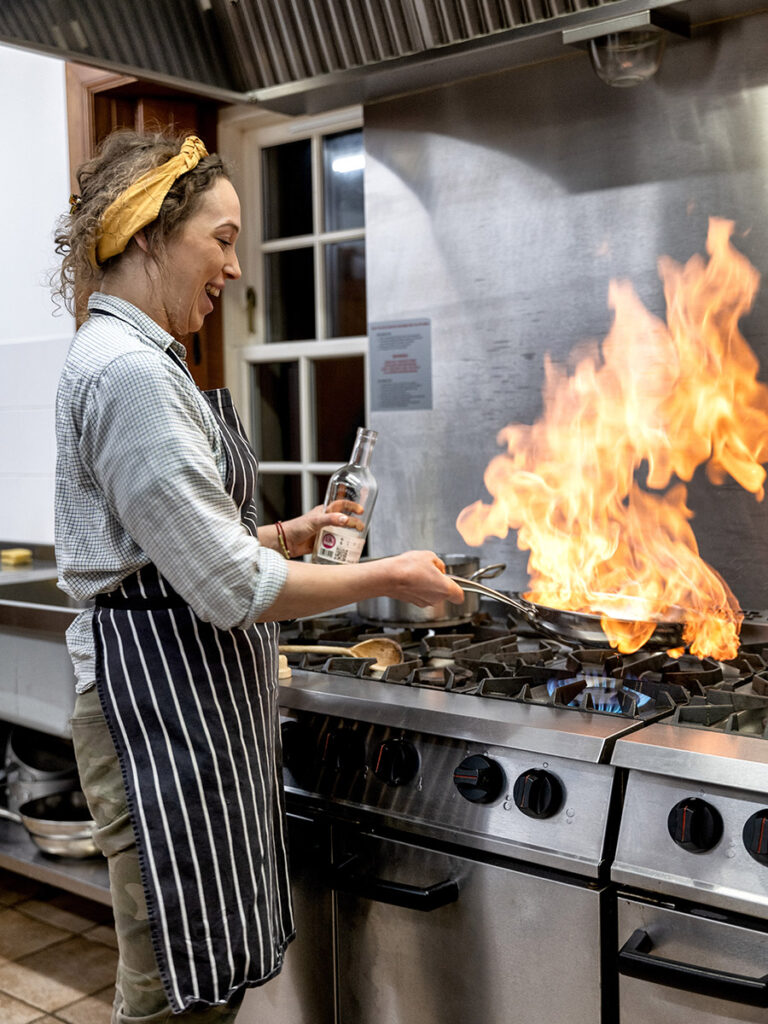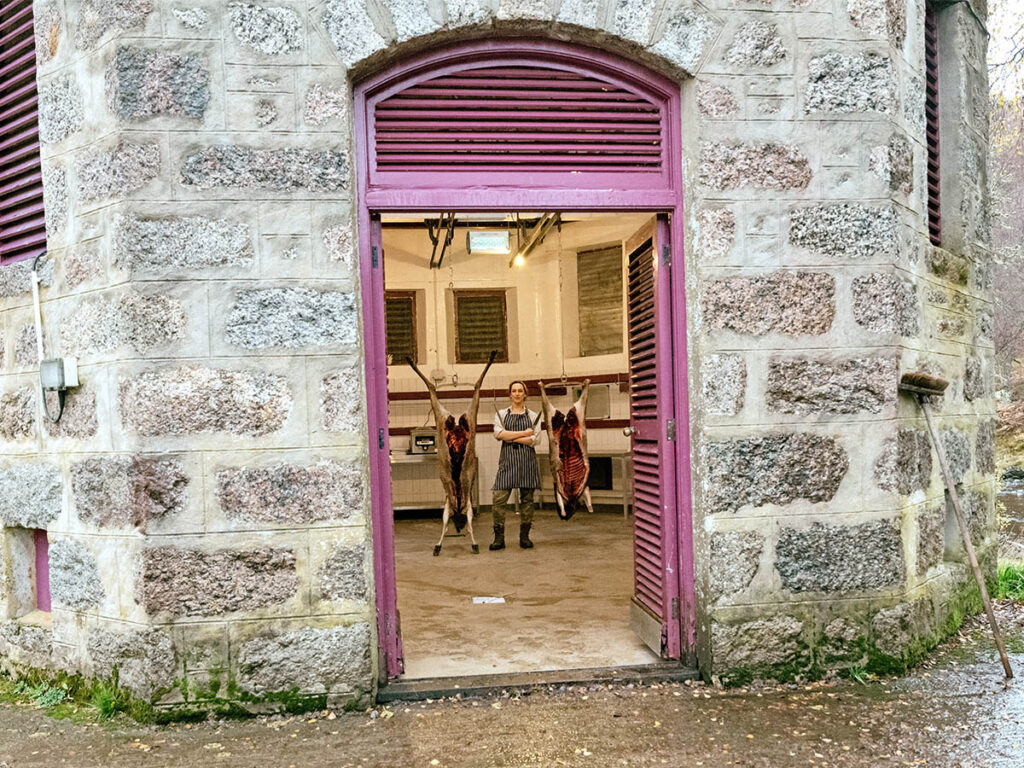At CarnivoreWeb.com, we independently review products and outfitters. However, we may earn a commission when you purchase products through links on our site. Read our affiliate policy. Read about how we test products.
Lucy Pattinson had a checkered start to her career, but now serves game dishes to aristocracy.
Lucy Pattinson embodies the idea that if you believe you can do something, you can achieve it. One of the next generation of young wild game chefs, she’s boundlessly energetic with a wicked sense of humor. In the past couple of years, she’s managed to turn hard work and a passion for creating food from the forest, mountains, and water of Scotland into a successful catering business with some seriously high-end clients.
Catch up with her on Instagram @thefodderation.

CARNIVORE: How did you start working with wild game?
Lucy Pattinson: My grandparents had a farm in Derbyshire (England), and my siblings were all a bit feral growing up. One year, my dad was tasked with buying Christmas presents for my sister and me when I was 11, so naturally he bought us both .410s. When I went back to school after the holidays all my friends were asking, ‘What did you get for Christmas?’ And so the next thing I knew my parents got a letter from the school. They were saying that Lucy said she got a gun for Christmas; she’s obviously lying, and that this is unacceptable. My mom had to put them straight, and after that, my dad and I would go sit on the edge of the duck pond and put the world to rights. So, quality daddy-daughter time. Of course, we’d eat whatever we’d shot, so that was my introduction to wild game cooking.
So from those early days, where did you go from there?
LP: [Laughs] How much time have you got? I’ve had a lot of jobs over the years as I tend to get bored easily. I was quite smart at school but decided not to go on to higher education, as the government tripled the tuition fees the year I graduated and I didn’t see the cost/benefit ratio. I’d worked since I was 13 doing the sh*t jobs in kitchens — cleaning fridges, prepping vegetables, that kind of thing — and then I went on to be a wedding coordinator for a few years, a nanny, and worked in a pub. After moving in with my sister in London, I wound up being a personal assistant for Sinnita [Malone, a minor British celebrity], which was pretty bizarre but not as bizarre as having Simon Cowell as my landlord and interning for an Ecuadorian mafia boss. After a few years in London, I moved to Scotland to take on a business development role for a chocolate company, which saw me hitting the international trade show circuit before quitting that to go on what was supposed to be a four-week food and wine tour with my sister. The idea was to experience different cuisines and wines in France, then I’d return to the UK and train to be a chef.
We bought an old Volvo V70 wagon, stuffed it with way too much gear, and drove to France. While we were there, the whole world went into lockdown mode due to COVID, and so our four-week trip turned into six months as we couldn’t get home. Our family doctor friend loaned us his family’s vacation cottage in the Ardeche mountains, where we had to forage for wood on the hillside behind the house to keep warm, fix broken water pipes, and had an epic time cooking, climbing mountains, and swimming in streams.
Anyway, all the money I was going to use to learn to be a chef we ate and drank, so when we went home I just said I was a chef. And some people believed me, and I just went from there.

So you started a catering company. What do you specialize in?
LP: Fire. Playing with fire. It’s not that you can’t control it, it’s that every fire is different and so the results are always varied. Obviously, there’s an element of risk when you’re cooking for a big crowd, but that’s one of the reasons I love it. I cater for a lot of hunting and fishing parties, and if I can use what the guests have shot or caught and prepare it over fire, then that’s the dream for me. Shoot it, kill it, cook it, eat it.
How much shooting or hunting do you get to do?
LP: I think my answer is the same as everybody’s — not as much as I’d like. My dad is a shotgun coach, so if I mention that, everyone expects me to be better than I actually am. I love woodpigeon shooting and would rather shoot woodpigeons than any driven game. They’re also my favorite game animal to cook.

For an American audience, the thought of eating pigeons can be off-putting. Here, they’re regarded as rats with wings, and we don’t have wild woodpigeons. Can you explain the difference?
LP: A rat with wings is a nasty feral little f*cker that scuttles around cities eating sh*t out of bin bags, while a woodpigeon is a noble wild bird that lives in the countryside eating berries and grain. To cook them, I use a really hot fire, keep the seasonings simple, sear the breasts and keep them really rare, let them rest, and serve over a bed of greens.
One of my favorite things is to take game and cook it in ways you’re not expecting. We’ve all had game casserole or game pie, and they’re delicious most of the time, but they can be boring. I catered a hunting party in Sweden, and the first day they were there they knocked on the door about 10 minutes before dinner time and presented me with a moose heart still dripping with blood — about one round of CPR away from still being alive. I think they were trying to freak me out a bit. I saw it and went, ‘Awesome! Can I have it?’ So that evening I took it and diced a little of it up with some smoked sea salt for canapes, and the next day I seared it for a moose heart salad with fire-roasted sweet potatoes, pine nuts, and goat cheese.
Now that you’re in Scotland, are you doing any deer hunting yourself?
LP: Yes, I’ve got more into stalking over the past year and bought my first proper rifle, a Tikka T3X in 308, and I absolutely love it. I recently finished a five-week residency for a big family in a hunting lodge — five adult brothers and sisters, European aristocracy so there’s always people coming and going. There’s eight miles of private drive to get to the lodge from the main road, and it’s an hour to town, so planning meals and making sure you have all the supplies needed to cover all eventualities is a big thing. Anyway, I put it into the contract that I’d chef for five weeks for this much money, plus one stag. [Laughs]
How was that hunt?
LP: One of the most magical experiences I’ve ever had. The hills are super steep and exposed — just vast. We’re standing on one of them, and the mist and the fog came in, then the rain, then the sleet, and finally the hail started. You know when it feels like splinters in the side of your face? I was walking up the side of the mountain and remember thinking, This is the hills saying to me, you’ve got to really love this to be here.

What’s the hardest part of your job?
LP: It would be easy to say admin, because that’s tedious, but actually the hardest part of my job is that it’s based on catering for hunting and shooting parties, which means that if I’m working, I’m missing out on the season. I’ll have friends who’ll call up and ask if I want to go out hunting with them. and I have to say no.
So when do you open your restaurant?
LP: I don’t want a restaurant. I only want to do adventure cooking, but it doesn’t always have to be for hunting parties, so long as it’s exciting and in a harsh environment. For example, there’s a group that took Royal Enfield motorbikes around the isle of Jura and they’d rock up in the evening, and I’d have the fire going and dinner waiting. That’s the kind of thing that sets my soul on fire, especially if I can work some aspect of wild game into the menu.

When you cater for parties like that, do you have to sell them on the idea of game cooking?
LP: Almost never. I usually find that if they’re into doing things that need a sense of adventure, then they’re open to the idea of sustainably sourced wild meat. A lot of what I do is spur of the moment, like, here’s this thing, do something with it. Like when I ran into a friend who was coming back from mackerel fishing and guess what was on the menu two hours later.
You seem to have found a niche.
LP: I think I’ve finally found something I’m good at, and I love it so much that even in the times I’m maybe not so good, I can convince people. Before I sign with a client, I always give them the opportunity to sample my food, and I’m always up front about not being classically trained. I’ve never had anyone go, ‘Oh my God, this so delicious, but you’re not a trained chef so you can’t have the job.’

Editor’s Note: This article originally appeared in Carnivore Magazine Issue 9.
More On Game Cooking
- Venison Philly Cheesesteak
- Sous Vide Wild Boar Shank
- Elk Jerky
- Easter Bear by Hank Shaw
- Mediterranean Spiced Ground Venison Kofta
Why You Can Trust CARNIVORE
Since its launch, CarnivoreWeb.com has been a trusted authority on hunting, fishing and wild food, delivering expert insight for outdoorsmen who live the field-to-table lifestyle. More than a hunting and fishing site, CarnivoreWeb.com covers the full spectrum of the modern outdoors—from rifles, bows, and fishing gear to cooking, conservation and adventure.
Our contributors are drawn from across the hunting and angling world, including seasoned guides, lifelong hunters, competitive shooters and outdoor writers with decades of field experience. Every review, article and feature is built on firsthand testing, deep research, and an unwavering commitment to accuracy.
Commitment to Journalistic Principles
At CarnivoreWeb.com, upholding journalistic integrity is our top priority. We follow strict editorial standards to ensure all content is accurate, transparent, and unbiased. Our editors and writers operate independently, free from outside influence, advertisers or stakeholders. We adhere to established journalistic codes of ethics, holding ourselves accountable for the information we publish, correcting errors when they occur and disclosing any potential conflicts of interest.
This commitment ensures that our readers can trust CarnivoreWeb.com to provide reliable, honest coverage that helps them make informed decisions—whether selecting gear, honing outdoor skills or preparing wild game.
Find out more about our Editorial Standards and Evaluation Process


